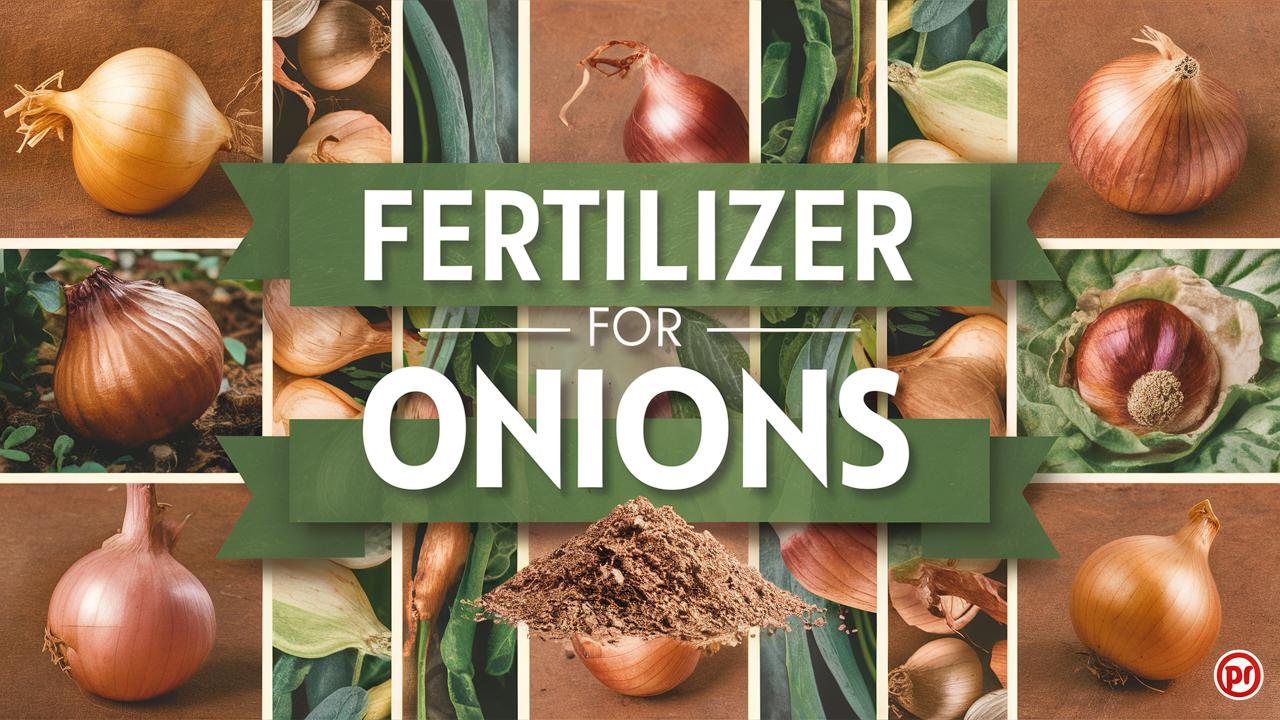In this comprehensive guide, we will explore how to choose a fertilizer for onions, ensuring you provide these bulbs with the nutrients they need to thrive.
Fertilizer For Onions
| Image | Name | Rating | Shop |
|---|---|---|---|
 | Hi-Yield Grower’s Special Fertilizer |  | |
 | Vegetable Growth Fertilizer |  | |
 | Southern Ag All Purpose Granular Fertilizer |  |
Hi-Yield Grower’s Special Fertilizer
The Hi-Yield Grower’s Special Fertilizer is a versatile option for various garden plants, including trees, shrubs, and ornamentals. This fertilizer provides a balanced blend of essential nutrients.
This formula features 12% nitrogen, 6% phosphate, and 6% soluble potash, with slow release nitrogen to minimize the risk of burn. While its application varies based on plant type, it can be applied every 6 weeks for container plants or in early spring and late fall for trees and shrubs.
Vegetable Growth Fertilizer
For onion growers looking to boost their harvest, consider using Onion Fertilizer. This formula provides a well-rounded blend of macronutrients and micronutrients that help accelerate plant growth.
This fertilizer contains essential elements like nitrogen, phosphorus, potassium, calcium, magnesium, sulfur, boron, copper, manganese, and zinc – everything onions need to reach their full potential. With regular use, Onion Fertilizer can lead to a higher quality crop with increased yields.
Southern Ag All Purpose Granular Fertilizer
For onions, you’ll want to give them a fertilizer that provides balanced nutrients for optimal growth. Southern Ag All Purpose Granular Fertilizer 10-10-10 is a good option because it’s designed for general gardening purposes yet has enough nitrogen, phosphorus, and potassium (N-P-K) in a 10-10-10 ratio to promote healthy vegetation.
This all-purpose fertilizer comes in a 5-pound size which should last for multiple plantings. Since there is no detailed description of the product’s effects on different types of plants, you’ll just need to follow the application instructions and see how it affects your onion crop. Note that this may not be specifically designed for onions, but the balanced N-P-K ratio makes it a versatile fertilizer suitable for a range of needs.
Organic Plant Soil
For those looking to fertilize their onions, we recommend Dr. Earth Organic 5 Tomato, Vegetable & Herb Fertilizer Poly Bag.
This fertilizer is specifically designed for optimal levels of primary plant nutrients, ensuring a healthy growth environment for your onions. Additionally, the product contains no GMOs, chicken manure or sewage sludge, making it an organic and natural choice. The added pro-biotic and beneficial soil microbes further enhance its effectiveness in promoting stronger and more abundant onion crops.
Nitro Bloom Max
 Here are two paragraphs giving a product recommendation for Southern Ag PowerPak 20-20-20 Water Soluble Fertilizer with micronutrients. If you’re looking to give your onions a nutrient-rich boost, consider using the Southern Ag PowerPak 20-20-20 Water Soluble Fertilizer. This all-purpose fertilizer is suitable for a wide range of plants and will provide your onions with the nitrogen, phosphorus, and potassium they need to thrive. What’s more, this product also contains chelated minor elements that will help ensure your onion plants are getting the micronutrients they require. And because it’s water soluble, you can easily mix it into a spray solution or add it directly to your soil, making it a convenient option for fertilizing onions and other vegetables, flowers, and shrubs.
Here are two paragraphs giving a product recommendation for Southern Ag PowerPak 20-20-20 Water Soluble Fertilizer with micronutrients. If you’re looking to give your onions a nutrient-rich boost, consider using the Southern Ag PowerPak 20-20-20 Water Soluble Fertilizer. This all-purpose fertilizer is suitable for a wide range of plants and will provide your onions with the nitrogen, phosphorus, and potassium they need to thrive. What’s more, this product also contains chelated minor elements that will help ensure your onion plants are getting the micronutrients they require. And because it’s water soluble, you can easily mix it into a spray solution or add it directly to your soil, making it a convenient option for fertilizing onions and other vegetables, flowers, and shrubs.
Organic Garden Fertilizer
This is a recommendation for the Down to Earth Organic Vegetable Garden Fertilizer 4-4-4, 5 lb product. If you’re looking for a fertilizer that’s safe for the environment and easy to use, this could be a good option.
The slow-release formula and all-natural ingredients make this a great choice for growers who want to create a chemical-free growing environment without sacrificing plant health. The balanced NPK ratio of 4-4-4 also makes it suitable for onions and other vegetables that require consistent nutrient delivery. This product is easy to apply directly to the soil or mix into garden beds, making it a versatile option for a range of gardening needs.
Garden Food 5-10-5
The Espoma 5-10-5 Garden Food is a well-rounded fertilizer that provides all three major plant nutrients, making it suitable for a variety of plants including onions. This product is designed to promote growth in flowers, trees, shrubs, and vegetables.
This granular fertilizer is easy to apply and requires no mixing, simply sprinkle it on the soil around the drip line of the plant and water thoroughly. It can be used in the spring and fall for trees and shrubs, while flowers and vegetables can benefit from a monthly application throughout their growing season.
How To Choose a Fertilizer For Onions
Growing onions can be a rewarding venture, whether you are cultivating a small kitchen garden or managing a larger agricultural project. These versatile vegetables are a staple in many cuisines and offer numerous health benefits. However, to achieve a bountiful onion harvest, proper nutrient management is crucial, which is why selecting the right fertilizer is essential.
Understanding Onion Nutritional Needs
Before diving into fertilizer options, it’s imperative to understand the nutritional requirements of onions. Onions are heavy feeders, meaning they require a significant amount of nutrients throughout their growth cycle. The primary macronutrients necessary for onion growth include nitrogen (N), phosphorus (P), and potassium (K), often referred to as N-P-K.
Nitrogen (N): Essential for leaf and overall plant growth, nitrogen promotes lush foliage. Since onions primarily grow by developing their leaves before forming bulbs, adequate nitrogen levels are significant in the early stages of growth.
Phosphorus (P): This nutrient aids root development and is critical during the early growth stages. Phosphorus enhances flowering and fruiting, playing a vital role in bulb formation as onions mature.
Potassium (K): Potassium strengthens overall plant health, improving resistance to diseases and drought. It also aids in the development of bulb size and flavor, making it crucial for quality onion production.
Moreover, onions also benefit from micronutrients like calcium, magnesium, sulfur, and trace elements such as boron and zinc. Each of these nutrients supports different aspects of growth, from root health to bulb development. Understanding these requirements helps in selecting a fertilizer that meets the needs of your onion crop.
Types of Fertilizers Available for Onions
With various fertilizer types on the market, choosing the right one may seem daunting. Here’s a breakdown of the primary types of fertilizers and how they can be effective for onion cultivation:
1. Organic Fertilizers
Organic fertilizers are derived from natural sources, such as manure, compost, bone meal, and seaweed. They improve soil structure, promote beneficial microorganisms, and release nutrients slowly over time, providing a sustainable option for long-term soil health.
Compost: Rich in microbes and nutrients, compost adds organic matter to the soil, improving overall fertility.
Manure: Well-rotted animal manure provides a balanced source of nutrients, particularly nitrogen.
Bone Meal: An excellent source of phosphorus, bone meal promotes healthy root systems.
Kelp Meal: This seaweed-based fertilizer is rich in trace minerals and can enhance plant stress resistance.
2. Synthetic Fertilizers
Synthetic fertilizers are chemically manufactured and are effective for quick nutrient availability. They often come in granular or liquid forms and can provide specific nutrient ratios tailored to onion needs.
Granular N-P-K Fertilizers: These are formulated with specific ratios of nitrogen, phosphorus, and potassium. For onions, a balanced fertilizer with slightly higher nitrogen content is beneficial in the early stages.
Liquid Fertilizers: These allow for quick absorption by plants, making them suitable for treatments during the growing season, especially if nutrient deficiencies are suspected.
3. Slow-Release Fertilizers
Slow-release fertilizers gradually deliver nutrients over an extended period, reducing the frequency of applications. They are particularly useful for busy gardeners or those looking for a more hands-off approach to feeding onions.
4. Fertilizers with Micronutrients
Some specialized fertilizers contain micronutrients in addition to the main macronutrients. This is beneficial for onions, which require elements like boron and zinc for optimal growth and bulb formation. Look for products that explicitly mention micronutrient content when selecting your fertilizer.
Soil Testing: The First Step in Choosing Fertilizer
Before purchasing fertilizer, conducting a soil test is indispensable. This assessment provides concrete information about your soil’s nutrient levels, pH, and organic matter content. Understanding these factors enables you to make informed decisions regarding fertilization.
How to Soil Test
Collect a Soil Sample: Use a clean tool to gather samples from multiple areas of your garden, particularly where you plan to plant onions.
Analyze Results: Submit your sample to a local extension service or commercial soil testing lab, and analyze the report for nutrient levels and pH.
Interpreting pH: Onions thrive in soil with a pH between 6.0 and 7.0. If your soil pH is off, you may need to amend it with lime (to raise pH) or sulfur (to lower pH).
Adjusting Nutrient Deficiencies
Based on your soil test results, identify any nutrient deficiencies and select the fertilizer that addresses these needs. For example, if the soil test indicates low nitrogen, a nitrogen-rich fertilizer may be necessary.
Timing Your Fertilization
The timing of fertilizer application is crucial to the success of your onion crop. Onions have different nutrient requirements during various growth stages, and applying fertilizer at the right time can significantly enhance growth.
Pre-Planting Fertilization
Incorporate fertilizers into the soil before planting onions. Use well-rotted compost or a balanced N-P-K fertilizer to enrich the planting bed. This foundational nutrient boost helps set the stage for robust onion development.
Side-Dressing During Growth
Apply additional fertilizer as a side-dressing several weeks after planting, especially when you observe significant leaf growth. A nitrogen-rich fertilizer is typically beneficial at this stage to support leaf expansion and bulb development.
Fertilizing Later Stages
As the onion bulbs start to swell, reduce nitrogen and increase potassium and phosphorus to support bulbing. This shift in nutrient focus helps maximize bulb size and quality, ensuring you get the most out of your harvest.
Choosing the Right N-P-K Ratios for Onions
When selecting a granular or liquid fertilizer, the N-P-K ratio can guide your choice. Each number represents the percentage of nitrogen, phosphorus, and potassium, respectively.
Recommendations for N-P-K Ratios
Early Growth: A fertilizer with a higher nitrogen content, such as 10-20-10 or 21-0-0, supports lush leaf and root growth.
Bulb Formation: Switch to a balanced or higher phosphorus and potassium fertilizer, such as 5-10-10, to promote healthy bulbing and enhance flavor.
Note on Fertilizer Burn
Be cautious of over-fertilizing, which can lead to nutrient burn. Always follow the manufacturer’s recommended application rates and consider under-fertilizing initially, incrementing as necessary based on plant response.
Organic vs. Synthetic: Pros and Cons
When deciding between organic and synthetic fertilizers, consider the pros and cons of each type. Your choice may depend on your gardening philosophy, budget, and specific onion growing conditions.
Organic Fertilizers
Pros:
Environmentally friendly and sustainable.
Improves soil health and biodiversity.
Reduces the risk of over-fertilization.
Cons:
Nutrients are released more slowly.
May require larger quantities than synthetic options.
Synthetic Fertilizers
Pros:
Fast-acting and straightforward to apply.
Targeted nutrient profiles for specific plant needs.
Generally more cost-effective for large-scale production.
Cons:
Potential for soil degradation and microbial imbalance with excessive use.
Risk of nutrient runoff leading to environmental pollution.
Tips for Applying Fertilizer Effectively
To maximize the benefits of your fertilizer choice, consider these practical tips for application:
Follow Instructions: Always adhere to the recommended application rates and timings provided by the manufacturer.
Watering After Application: After applying fertilizer, water the area thoroughly to help nutrients penetrate the soil and reach the onion roots.
Monitor Plant Health: Keep an eye on your onion plants for signs of nutrient deficiency or excess. Yellowing leaves, stunted growth, or poor bulb formation can indicate imbalances that need addressing.
Rotate Fertilizers: If using fertilizers, consider rotating between different types or brands to prevent soil nutrient depletion and imbalances.
Combine with Good Cultural Practices: Pair proper fertilization with good cultural practices, such as crop rotation, mulching, and pest control, to enhance overall onion health.
Conclusion: A Tailored Approach to Success
Choosing the right fertilizer for onions is not just about picking a product off the shelf; it involves understanding your soil, the nutritional requirements of onions, and the growth stages of the plants. By conducting soil tests, timing applications correctly, and selecting the appropriate N-P-K ratios, you can create an optimal growing environment for your onions.








